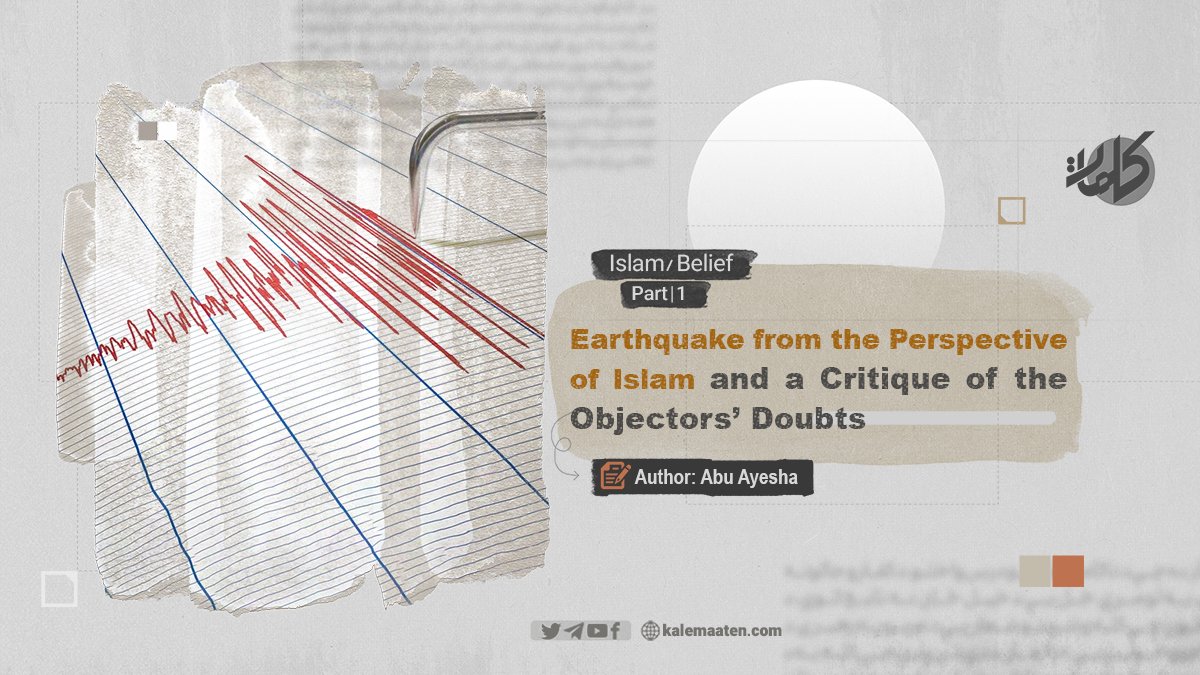Author: Abu Ayesha
Earthquakes from the Islamic Perspective and Critique of Objectors’ Doubts (Part One)
Abstract
Natural events and calamities that occasionally befall humanity, sometimes causing significant damage, are not merely physical or natural phenomena; rather, they are signs of the infinite power of the Creator, part of the wise system of creation, and lessons to awaken people from heedlessness and the sleep of neglect. The lessons which are meant to alert many humans and turn their attention back to God Almighty. One such example is earthquakes. The Holy Qur’an and the Sunnah of the Prophet Muhammad (peace be upon him) sometimes regard earthquakes as a means of awakening, reminder, testing, or even punishment for certain communities that defied divine commands. Learning from and taking heed of such events is one of their primary purposes.
However, today there are various groups that deny the aspect of admonition or punishment in these events, claiming instead that they are purely natural phenomena. They raise some well-known doubts regarding this issue. In this study, we aim to examine earthquakes from the perspective of the Qur’an, the sayings of the Prophet Muhammad (PBUH), and the opinions of scholars, and to respond to the objections of such critics.
Keywords: Divine test, natural events, earthquake, doubts, punishment.
Introduction
In today’s world, human beings, in addition to daily life challenges, confront crises caused by others, and sometimes face natural events and disasters. Just as previous generations throughout history have encountered these natural calamities and divine tests, often suffering the consequences in pain and affliction.
Although humanity has learned to cope with these difficulties to some extent, it has never been capable of completely eliminating or controlling them. Such events, in addition to damaging the environment, often lead to severe losses and tragic human, economic, and social consequences. Sometimes the scope and impact of these events are so vast that no power can resist them. For example, recent earthquakes and storms around the world have shaken nations and caused widespread turmoil.
We can imagine the magnitude and intensity of the earthquake on the Day of Judgment. While the earthquake of the Hereafter and the extent of its damage are beyond human comprehension, there is no doubt that it is one of the greatest signs of the Last Day. Beyond its apparent worldly causes, it is also a symbol of divine punishment and retribution. As God Almighty says: “یا آیها الناس اتقوا ربکم إن زلزلة الساعة شيء عظیم”[1] Translation: “O mankind, fear your Lord. Surely, the quake of the Hour is a tremendous thing.”
This is where we understand that the small earthly earthquakes are a reminder of the great earthquake of the Day of Resurrection, and since natural disasters and phenomena beyond human power awaken the inner self of man, they compel him — before falling into such catastrophes — to reflect on the relationship between the material and spiritual causes of these events: What are the real causes of such occurrences? Can human beings, through their actions, play a role in the coming or prevention of these natural disasters and major calamities? Does human behavior contribute to the emergence of such crises and problems or not? Or are these events entirely unrelated to mankind and intended for some other purpose?
In this research, we strive to present the definition of “earthquake” from a linguistic perspective, the statements of the scholars regarding earthquakes, the incidents and events that have occurred throughout history — from the era of the noble Companions (may Allah be pleased with them) until today — as well as the objections and doubts raised by atheists and critics on this matter. Then, by reasoning through the Qur’anic verses and the Ahadith of the Prophet (PBUH), we aim to prove that earthquakes and other events are lessons for reflection and awakening for all humanity, and not merely purely natural occurrences.
Before delving into the main discussions of this research, it is better to first look at the word “earthquake” from a linguistic perspective.
Linguistic Meaning of “Zalzalah” (Earthquake)
زلزل یزلزل زلزلة و زلزالاً — derived from the quadriliteral root pattern — zalzalah and zilzāl mean: to cause something to move or shake.
Abu Ishaq (MABH), while interpreting the verse of Allah the Almighty: [2]“إِذَا زُلْزِلَتِ الْأَرْضُ زِلْزَالَهَا” says: it means that the earth will be shaken very violently.
Imam Anbari (MABH), regarding the expression of the Arabs “أَصَابَتِ الْقَوْمَ زَلْزَلَةٌ”, states: “They were frightened and warned” — because Allah the Exalted says: [3]“وَزُلْزِلُوا حَتَّى يَقُولَ الرَّسُولُ”meaning: they were made to fear and were warned.
The word الزلازل (earthquakes) in Arabic is also used to mean hardships and severe trials. [4]
To be continued…
Next Part
References:
[1] Surah Al-Hajj, Ayah 1
[2] Surah Az-Zalzalah, Ayah 1
[3] Surah Al-Baqarah, Ayah 214
[4] Ibn Manzur, Muhammad ibn Mukarram, Lisan al-Arab, under the root “زلل (Z-L-L)”, vol. 11, p. 306.



